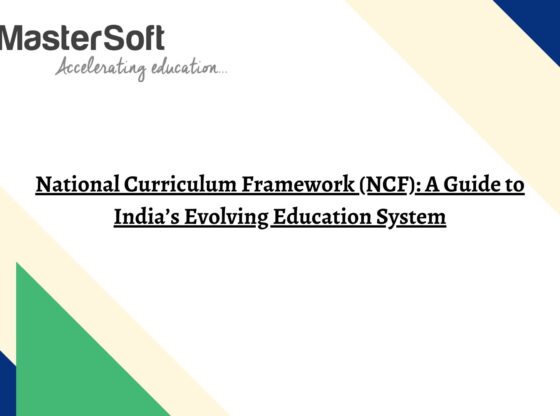Education plays a crucial role in shaping a nation’s future, and a well-structured curriculum is essential for a strong education system. The National Curriculum Framework (NCF) serves as a guiding document for developing school curricula in India. It aligns with educational policies, promotes holistic learning, and adapts to evolving academic and societal needs.
This blog provides a detailed overview of NCF, including its objectives, key features, significance, and recent updates under the National Education Policy (NEP) 2020.
What is the National Curriculum Framework (NCF)?
The NCF is a policy framework developed by the National Council of Educational Research and Training (NCERT) to guide curriculum design in Indian schools. It provides recommendations for syllabus structure, teaching methodologies, and assessment techniques across different levels of education.
Since its inception, NCF has undergone multiple revisions to ensure relevance in changing educational landscapes. The latest NCF 2023 is developed under NEP 2020 to modernize education and enhance learning outcomes.
Evolution of NCF in India
The National Curriculum Framework has been revised multiple times to meet educational needs. Here’s a timeline of major NCF revisions:
- NCF 1975 – Focused on universalizing primary education and introducing activity-based learning.
- NCF 1988 – Emphasized learning beyond textbooks and introduced value education.
- NCF 2000 – Integrated technology in education and introduced the concept of joyful learning.
- NCF 2005 – Shifted towards constructivist learning, competency-based education, and reducing rote memorization.
- NCF 2023 – Developed under NEP 2020, emphasizing foundational literacy, skill-based learning, digital education, and holistic student development.
Key Objectives of the National Curriculum Framework
The primary goals of NCF are:
- Holistic Development: Encouraging cognitive, emotional, social, and physical development.
- Reducing Rote Learning: Shifting focus from memorization to conceptual understanding and skill-building.
- Multidisciplinary Approach: Promoting an integrated curriculum with flexibility in subject choices.
- Competency-Based Education (CBE): Developing critical thinking, problem-solving, creativity, and analytical skills.
- Inclusive Education: Ensuring equal learning opportunities for all, including children with special needs.
- Integration of Technology: Encouraging digital tools, AI, and interactive learning resources.
- Assessment Reform: Moving from high-stakes board exams to continuous and comprehensive evaluation (CCE).
Structure of NCF 2023
The latest NCF 2023 introduces a 5+3+3+4 structure, replacing the traditional 10+2 system.
1. Foundational Stage (Ages 3-8) | 5 Years
- Covers preschool to Grade 2.
- Focuses on play-based, activity-based, and experiential learning.
- Strong emphasis on foundational literacy and numeracy (FLN).
2. Preparatory Stage (Ages 8-11) | 3 Years
- Covers Grades 3 to 5.
- Introduces interactive, discovery-based, and multidisciplinary learning.
- Encourages students to explore subjects through hands-on activities.
3. Middle Stage (Ages 11-14) | 3 Years
- Covers Grades 6 to 8.
- Strengthens conceptual understanding across subjects.
- Focus on experiential learning, vocational training, and project-based education.
4. Secondary Stage (Ages 14-18) | 4 Years
- Covers Grades 9 to 12.
- Introduces flexible subject selection and multiple exit options.
- Encourages skill development, internships, and career-oriented learning.
Significance of NCF in Education
✅ Encourages Skill-Based Learning
NCF promotes practical skills, vocational education, and digital literacy, preparing students for future careers.
✅ Enhances Critical Thinking & Creativity
By focusing on competency-based education, students learn to analyze, evaluate, and apply knowledge.
✅ Promotes Multilingual Education
NCF encourages mother tongue-based learning in early education to improve comprehension and retention.
✅ Reduces Exam Pressure
The new assessment system focuses on continuous evaluation, reducing stress and allowing students to progress at their own pace.
✅ Boosts Global Competitiveness
Aligning with international education standards, NCF prepares students for global opportunities.
NCF’s Impact on Teachers & Schools
For Teachers:
- More freedom to innovate in teaching methodologies.
- Shift from rote-based instruction to experiential learning.
- Increased use of technology-driven teaching tools.
For Schools:
- Adoption of flexible and student-centric curricula.
- Focus on inclusive classrooms and skill-based learning.
- Integration of digital learning resources and hybrid education models.
Challenges in Implementing NCF
Despite its benefits, NCF implementation faces challenges, such as:
- Teacher Training Needs: Educators must be trained in new pedagogical methods.
- Infrastructure Gaps: Rural schools may lack digital resources and teaching aids.
- Parental Awareness: Parents must be educated on competency-based learning and assessment reforms.
- Curriculum Transition Issues: Schools need time to adapt to new subjects, teaching methods, and assessments.
Future of NCF & Education in India
NCF 2023 marks a transformational shift in education. The framework aligns with NEP 2020’s vision of holistic, inclusive, and flexible education, ensuring that students are well-equipped for higher education and employment.
With continuous reforms and technology integration, NCF is set to modernize learning, empower educators, and elevate India’s education system globally.
Conclusion
The National Curriculum Framework (NCF) is a crucial step towards reshaping India’s education system. By focusing on competency-based learning, flexibility, technology, and skill development, NCF prepares students for a dynamic and competitive world.
As India moves forward with education reforms, implementing NCF successfully will require collaboration between educators, policymakers, parents, and students. The future of education is bright, inclusive, and student-centered, and NCF is leading the way!

